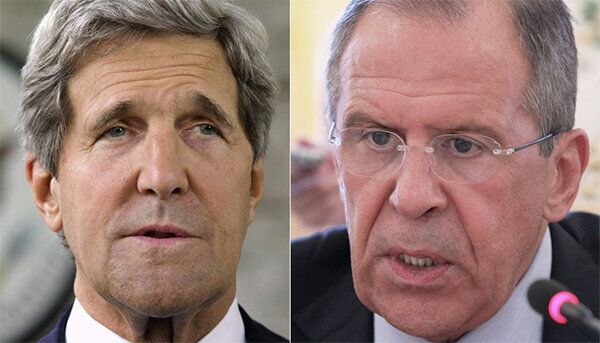WASHINGTON, September 10 (by Karin Zeitvogel for RIA Novosti) – When US Secretary of State John Kerry said Syria could avert a US military strike by quickly placing its chemical arms under international control, he set off a round of global speed diplomacy to try to resolve the Syria crisis peacefully.
Here are some key moments in a process of just over 31 hours that saw a seemingly offhand comment from Kerry snowball into a major change in the US approach to Syria and a global diplomatic push to prevent further use of chemical arms in that country’s two-year civil conflict. Timings are approximate and based on video feeds, official statements and publication of initial media bulletins.
MONDAY – 1126 GMT: US Secretary of State John Kerry says in response to a reporter’s question in London that Syrian President Bashar Assad could avert a US military strike if he hands over all his country’s chemical weapons to the international community.
“He could turn over every single bit of his chemical weapons to the international community in the next week. Turn it over, all of it, without delay, and allow a full and total accounting for that. But he isn’t about to do it and it can’t be done, obviously,” a transcript released by the State Department quoted Kerry as saying.
1225 GMT: Russian Foreign Minister Sergei Lavrov says Moscow will urge Syria to take up Kerry’s apparent offer and put its chemical weapons under international control.
1330 GMT: UN Secretary General Ban Ki-moon welcomes what he calls the “ideas” put forward by Lavrov in Moscow and Kerry in London, and says he has “already been considering” asking the UN Security Council “to demand the immediate transfer of Syria’s chemical weapons and chemical precursor stocks to places inside Syria where they can be safely stored and destroyed.”
1349 GMT: Syrian Foreign Minister Walid Muallem, who is in Moscow for talks with Lavrov, welcomes what he calls Russia’s proposal for Syria to place its chemical weapons under international control.
1730 GMT: State Department spokeswoman Marie Harf tells reporters that Kerry’s remarks in London were “rhetorical and hypothetical,” but adds that the United States will nonetheless “take a hard look” at what she calls “the Russian proposal. ” Harf says Lavrov and Kerry discussed the proposal by phone as the US Secretary of State flew back to Washington from London.
1745 GMT: White House spokesman Jay Carney says the United States would carefully study the Russian proposal but expresses skepticism over whether Syria and the Russians would follow through.
1756 GMT: Kerry’s predecessor at the State Department, Hillary Clinton, says it would be “an important step” if the Assad regime cedes control of its chemical weapons to the international community.
2111 GMT: In televised interviews, President Barack Obama calls the Russian proposal “potentially positive” and says he would be “all for” a diplomatic solution to the crisis.
2126 GMT: US Senate majority leader Harry Reid announces that a vote that was due to be held in the full Senate on Wednesday on whether to authorize military strikes against Syria has been delayed.
TUESDAY – 0814 GMT: French Foreign Minister Laurent Fabius says France will bring a resolution before the UN Security Council, for Syria’s chemical weapons to be placed under international control. Breaching the resolution would hold “extremely serious” consequences for Syria.
0826 GMT: Russia says it will quickly put together a “workable” plan for placing Syrian chemical weapons under international control.
1125 GMT: Syria's main opposition bloc, the Syrian National Coalition, dismisses the Russian proposal and urges the West to go ahead with a strike against Assad's regime.
1352 GMT: Obama agrees to a discussion in the United Nations Security Council on what just about everyone is now calling “the Russian proposal.”
1440 GMT: Damascus is rocked by shelling as “the world focuses on what to do about chemical weapons in Syria,” the Associated Press reports.
RAW VIDEO: Shelling hits Damascus as the world focuses on what to do about chemical weapons in Syria: http://t.co/WVVaPFrcpw -MM
— The Associated Press (@AP) September 10, 2013
1445 GMT: Fabius says Lavrov has told him that Moscow is not in favor of a binding UN resolution, the BBC reports.
1600 GMT: Kerry tells a hearing of the House of Representatives Armed Services Committee that the United States will not wait for long for details of the Russian proposal.
1630 GMT: Kerry tells a lawmaker at the Armed Services Committee hearing that he “didn’t misspeak” when he made the statement in London that triggered the round of speed diplomacy over Syria, and says he and Obama are hoping for “a diplomatic and peaceful way to try to resolve this.”
1725 GMT: Kerry says any deal on Syria’s chemical weapons must be struck in a binding UN Security Council resolution.
1734 GMT: Syria’s foreign minister says the country is ready to join the Chemical Weapons Convention and declare its chemical weapons arsenal.
1848 GMT: US officials say Kerry will meet with Lavrov and Syria’s Muallem on Thursday in Geneva to discuss Syria’s chemical weapons.


